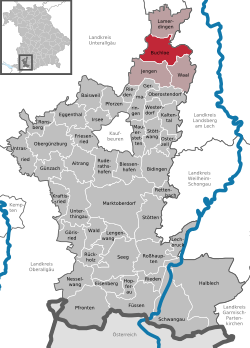Buchloe
| Buchloe | ||
|---|---|---|
|
||
| Coordinates: 48°2′15″N 10°43′30″E / 48.03750°N 10.72500°ECoordinates: 48°2′15″N 10°43′30″E / 48.03750°N 10.72500°E | ||
| Country | Germany | |
| State | Bavaria | |
| Admin. region | Schwaben | |
| District | Ostallgäu | |
| Municipal assoc. | Buchloe | |
| Government | ||
| • Mayor | Josef Schweinberger | |
| Area | ||
| • Total | 36.16 km2 (13.96 sq mi) | |
| Elevation | 627 m (2,057 ft) | |
| Population (2015-12-31) | ||
| • Total | 12,568 | |
| • Density | 350/km2 (900/sq mi) | |
| Time zone | CET/CEST (UTC+1/+2) | |
| Postal codes | 86807 | |
| Dialling codes | 08241, 08246 | |
| Vehicle registration | OAL | |
| Website | www.buchloe.de | |
Buchloe (German pronunciation: [buːxˈloːə]) is a community raised to city status in 1954, lying in Ostallgäu district in Bavaria. Together with the neighbouring communities of Jengen, Lamerdingen and Waal, Buchloe belongs to the Verwaltungsgemeinschaft ("administrative community") of Buchloe.
Buchloe lies right on Bundesautobahn 96 (Munich–Buchloe–Memmingen–Lindau) with interchanges with Bundesstraße ("Federal Highway") 12 (Lindau by way of Munich and Passau to Philippsreut) and describes itself as the "Gateway to the Allgäu". Buchloe station is an important railway hub for the Munich–Kempten– Lindau line on the Allgäu line (KBS 970) and for the Augsburg–Buchloe and the Buchloe–Memmingen lines with their IC services and direct services into Switzerland by EC.
Buchloe has quite a simple coat of arms, being a shield, party per pale, gules and argent. It was bestowed on the town officially in 1834, although it is based on a much earlier design that was already in use about 1500. The colours are those of the State of Augsburg, to which Buchloe belonged from 1311 to 1803, when it was absorbed into Bavaria. In the late nineteenth century, Buchloe assumed a different coat of arms, still a party per pale (i.e. a shield split straight down the middle) and silver on the right half, but gold on the left half with two leafy twigs – likely meant to be beech as the town's name comes from Buche, the German word for beech – twined about each other to form an emblem shaped rather like a section sign ("§"). In 1950, however, the original arms were officially restored.[1]
...
Wikipedia



